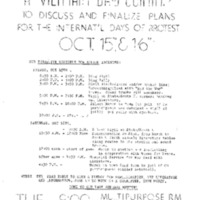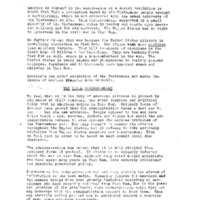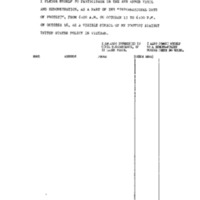International Days of Protest (October 1965)
The International Days of Protests, an idea for protests from the University of California-Berkeley, set the stage for draft protests to occur across the United States and the University of Michigan. Students began to take a more radical stance following the teach-in. Throughout May, there were several events where students at Berkeley participated in the burning of draft cards. Students marched to the Local Draft Board to present a black coffin to the staff to protest the United States Invasion of the Dominican Republic. The largest teach-in at Berkeley on May 21-23, 1965, concluded with students marching to the Draft Board once again to “hang” Lyndon Johnson, as well as participate in the burning of more draft cards. In an event leading up to the International Days of Protest, by the Berkeley Vietnam Day Committee, several hundred students attempted to stop trains carrying Armed Forces troops. The students were received outcry from faculty, as well as the government, with Joseph Bort, an Alamedia County Board of Supervisors member, saying “the manner in which these people protest is tentamount to treason."
The Berkeley Vietnam Day Committee designated October 15 and 16 as the International Days of Protests as a collaborative effort of numerous organizations across America, as well as several foreign countries as shown in a letter to the faculty of the University of Michigan on October 13, 1965. The committee invited Michigan to participate in the protests to protest the United States military presence in Vietnam, and the threat of a nuclear war. The group wanted to offer an open forum in order to discuss the implications of America’s role in Vietnam because “silence is an overt form of consent.” Berkeley collaborated with the Ann Arbor Vietnam Day Committee which called for the ending of the war by: “Immediate cessation of the bombings of North and South Vietnam; Immediate withdrawal of U.S. troops and military personnel; and recognition by the United States of Communist China.” The International Days of Protest gained the support of nearly seventy faculty members who endorsed the objectives of the Ann Arbor Vietnam Day Committee including Bill Gamson, Carl Ogelsby, Richard Mann, Marshall Sahlins, and Thomas Mayer and was a successful protest that ignited a series of events across the nation.
The International Days of Protest ignited a series of events across the nation despite the mixed opinion on it nationally, internationally, and with the administration of the University of Michigan. Before this, protest had died down to the form of marches and rallies. Draft resistors used more drastic tactics to show their opposition. A more radical tactic was draft card burning. President Johnson had recently signed a law that criminalized draft card burning: a fine of $10,000, with a prison sentence of up to five years. Despite possible arrest, this did not stop draft resisters from, not so freely, expressing their dissent for the war as seen in events that occurred on the same day as the International Days of Protest. On October 15th, 1965, in Manhattan, David Miller, a Catholic Worker from Syracuse, stood on a platform where he challenged federal law by burning his draft card. He said, “I believe the napalming of villages is an immoral act. I hope this will be a significant political act, so here.” Miller received arrest, trial and imprisonment for his actions. He was not attempting to dodge the draft, but rather bring national attention to the injustices of the Vietnam War. Though the American Civil Liberties Union attempted to defend Miller’s freedom of expression, eventually the Supreme Court did not rule in his favor.
The protest organized by Berkeley quickly spread nationally and internationally, which saw the participation of forty chapters of SDS. Edward V. Hanrahan, the Northern Illinois U.S. Attorney General, declared that “that he was going to investigate the possible treasonous nature of our anti-draft activity” in response to the headlines that appeared in Chicago newspapers. The government questioned whether the actions of SDS, who did not organize the protest, were influenced by ideas of Communism. The International Days of Protest marked a change in the anti-war movement from more dormant, intellectual based activism towards direct action protests where students took a physical stance against American policy in Vietnam.
Citations for this page (individual document citations are at the full document links)
"SDS National Council Report on Vietnam," 1965 SDS Bulletin Volume 4 Special Edition, Links to Resources from Students for a Democratic Society and Related Groups and Activities. http://archive.lib.msu.edu/AFS/dmc/radicalism/public/all/sdsbulletin/ALZ-5.pdf
"International Days of Protest," Vietnam Teach-In Miscellaneous, Box #5, J. Edgar Edwards Papers, Bentley Historical Library, University of Michigan.
"A Call for Action by the Ann Arbor Vietnam Day Committee," October 13, 1965, Vietnam Teach-In Miscellaneous, Box #5, J. Edgar Edwards Papers, Bentley Historical Library, University of Michigan.



